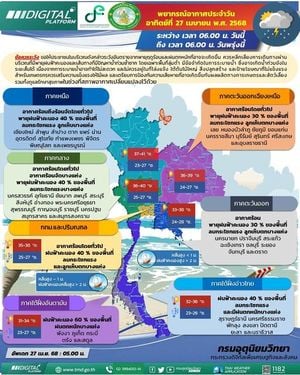The South African ambassador to the United States, Ebrahim Rasool, was greeted with jubilation upon his arrival back in Cape Town on March 24, 2025, following his dismissal from the U.S. under controversial circumstances. Rasool, who was expelled by the Trump administration, addressed supporters at Cape Town International Airport, expressing resilience and pride despite his controversial exit.
Rasool's expulsion was rooted in allegations that he engaged in political rhetoric detrimental to the Trump administration, with U.S. Secretary of State Marco Rubio labeling him a 'race-baiting politician.' The ambassador claimed that the decision to expel him was politically motivated, originating from his earlier comments suggesting that Trump's 'Make America Great Again' movement represents a 'supremacist reaction' to America's growing diversity.
In a statement that made headlines, Rasool stated, 'It was not our choice to come home, but we come home with no regrets' to a crowd of supporters waving placards decorated in the colors of the ruling African National Congress (ANC). His return home elicited cheers, applause, and songs from hundreds of supporters who showed up to welcome him.
'A declaration of persona non grata is meant to humiliate you,' he continued, wielding a megaphone to amplify his message. 'But when you return to crowds like this, and with warmth... I will wear my persona non grata as a badge of dignity and pride for standing firm in our values and doing the right thing.'
The backdrop to Rasool’s expulsion includes tensions between Washington and Pretoria, which have grown strained since Trump cut U.S. assistance to South Africa in early February. This decision was tied to accusations against the South African government of endorsing anti-white land acquisition policies and its support for a genocide case against Israel filed with the International Court of Justice (ICJ).
In recent months, Trump's government has alleged that South Africa's policies involve seizing land from white farmers and has offered those farmers an invitation to settle in the U.S. 'Welcome to the farmers in South Africa who want to come to America. You are all welcome!' Trump stated, adding fuel to the diplomatic fire.
Rasool, who once led anti-apartheid campaigns, is scheduled to meet with South African President Cyril Ramaphosa Monday to discuss the state of the nation’s foreign relations. He reiterated the importance of addressing the strained ties with the U.S. despite the controversies.
In addition to Rasool's expulsion, Trump’s rhetoric has hit a nerve globally, prompting many to criticize his approach to minority rights and international diplomacy. Critics of the administration have accused it of fostering an environment hostile to diversity and equity, claiming that these policies contribute to racial and political unrest. In response, Rasool emphasized the need for a paradigm shift in how South Africa interacts with global powers, notably the United States.
'We don't come here to say we are anti-American... We are not here to call on you to throw away our interests with the United States,' Rasool advocated, acknowledging South Africa's dependence on the U.S. economically and strategically.
Furthermore, he vowed that South Africa would not bow to pressure regarding its legal action against Israel for alleged genocide against Palestinians, asserting that these principles should not be sacrificed for the sake of diplomacy.
The South African government currently presides over the G20 and has identified the strengthening of its ties with the United States as a priority. With tangible trade relationships at stake, Ramaphosa's administration aims to recalibrate its foreign affairs strategy, possibly dispatching envoys to improve understanding and cooperation in economic, political, and social canvasses.
Amid this backdrop of international tension, the ramifications of Rasool's comments and eventual expulsion raise questions about how diplomatic relations can navigate the intersection of local policies and global expectations. The ambassador's defiance has positioned him as a symbol of resilience against perceived injustices.
As he embarks on this new chapter in South Africa, Rasool carries with him the charged political climate that has surrounded his departure from the United States and the uncertain future of diplomatic relations. Addressing his supporters, he emphasized that the fight for justice and accountability must continue, reinforcing the idea that engagement with the U.S. must be rooted in equitable principles.
The role of prominent international actors, such as Trump's alliance with Elon Musk, who has criticized South Africa’s government openly, adds complexity to the geopolitical dialogue. As both sides work through their differences, the eyes of the world will watch how South Africa navigates its future through the Here and Now, proudly embodying the spirit of its democratic values while addressing the challenges that lie ahead.





